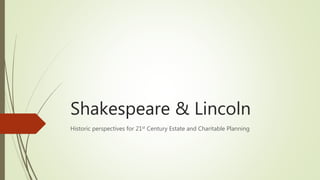Shakespeare-v-Lincoln
- 1. Shakespeare & Lincoln Historic perspectives for 21st Century Estate and Charitable Planning
- 2. Snapshot comparison Shakespeare Lincoln Entrepreneur – wildly successful – several business partners in his company Attorney, politician, President – one partner in his law firm Net worth at death = ? – estimate is L20 million+ in today’s terms Net worth at death = $110,000 $1.6 million in today’s terms Wife – life-long partner in building the family fortunes Wife – emotionally unstable spendthrift who was always cared for Children – Susanna: intelligent, well-off Judith: made poor choices Children – Robert: 23-year old Harvard grad – now head of the family Tad: special needs adolescent Comprehensive estate plan for family and business Died intestate No non-probate estate plans Both Shakespeare and Lincoln had reached the top of their professions and had business partners. Both Shakespeare and Lincoln had substantial assets in their estates. Both had family drama in their lives. Do their stories sound like any clients you know?
- 3. Estate Administration / Legacy Shakespeare  Susanna / Dr. Hall - executors  Trust Protectors  The inventory and the second-best bed  Orderly probate  What does Shakespeare’s “final word” reveal?  Seeing the legacy today Lincoln  David Davis – Supreme Court Justice – appointed administrator  Everything divided equally between wife and two sons  Wife’s 1/3 portion of chattel / personal property  Probate took 2 ½ years  We will never know Lincoln’s final word
- 4. Business Partners / Neighbors Shakespeare  Personal bequests – status  Blackfriar’s – left to family, and rented to the King’s Men – set up so that the partners could eventually purchase the property and theatre  Retirement / business succession plan had already been in place for some time  Real estate in and around Stratford- Upon-Avon / Warwickshire Lincoln  Left William Herndon with no way to buy out Lincoln’s interest in the practice  $250 fee for services rendered to clients before 1861  Family left without a source of income from his business interests  A few real estate investments in Illinois  Lincoln’s financial advisor had died in February 1865
- 5. Family – the central cell of society Shakespeare  Protected and provided for  Wife had a home and income for her lifetime  Daughter Judith’s “marriage portion” and the rest of the family fortune was safe  Secure income stream in perpetuity  Entail to continue property ownership(wealth) - intended to last for future generations Lincoln  Vulnerable and burdened  Family home was sold, Mary moved into a hotel / boarding house in Springfield  Mary was institutionalized on occasion, Robert bore the burden of those expenses  Assets distributed to each beneficiary outright – no creditor protection / spendthrift protection  Chaos and disintegration of the family
- 6. What does it mean for us?  Same issues  Estate planning for Death and Diminished Capacity  Grantor / Surviving Spouse  Family – treating children equitably v. equally  Business partners  Lifetime & legacy gifting (family, charitable)  Many advisors and partners around the table – coordinated action on behalf of a client / donor  Revealing conversations – story listening  Don’t get caught up in the mechanics too early
- 7. Family owned/controlled businesses  Family members who are employees / owners  Family members who are not employees / owners  Non-family members who are key employees / owners  Providing a stream of income from the business for survivors  Using philanthropy and business succession planning to achieve multiple goals  Converting the business into a multi- generational legacy for the entire family like Shakespeare did  “Every business can benefit from including philanthropy in the business plan”
- 8. Scarlett Ann Gray New proposals for the new paradigm
- 9. “I already have an estate plan . . . “  Immediacy – date that Shakespeare executed will  Things change  Family situation, Laws  Assets  Family home / Vacation home  Business / retirement  appreciation  Nomination of executors, trustees  Will the estate plan achieve what the client really wants?  Is the plan complete? Do all the documents and designations coordinate?  Clarity in the documents - proper transfer of assets, distribution of income, discretion – airtight to avoid failure of trust or litigation from heirs  Will the philanthropic institutions accept the gifts and agree to use them as the client wants?
- 10. New Paradigm – beyond the estate-tax motivation  Re-evaluate current plans  Benefits of Trusts  for Grantors/ Surviving Spouses  for Beneficiaries  Don’t necessarily eliminate life insurance / ILITs  Especially if there is agricultural land / business  Especially if there is charitable intent  Small and medium sized estates  Account for appreciation  Generation skipping-style techniques  Consider keeping bypass trusts in place  QTIP provisions
- 11. Charitable Planning / Stewardship ÔÇ¥ Demographics ÔÇ¥ Baby Boomers: $ / Volunteer ÔÇ¥ The follow-up generations ÔÇ¥ Lower incomes ÔÇ¥ Lower savings levels ÔÇ¥ Tithing ÔÇ¥ Support now ÔÇ¥ Endowed support for later ÔÇ¥ Nonprofit boards ÔÇ¥ Elevating the discourse











